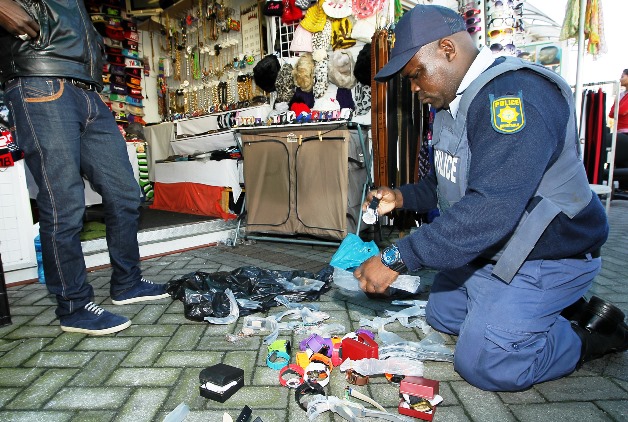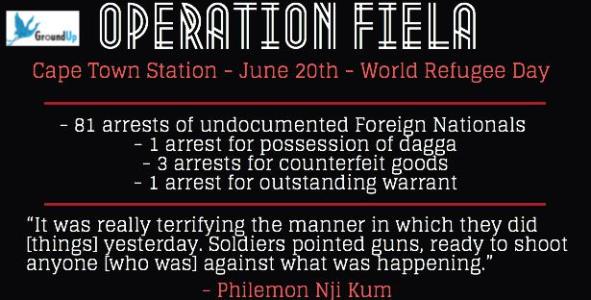Army closes down Cape Town Station

On World Refugee Day this weekend, South African police, traffic officials, metro police, brand specialists, immigration officials and defence force members shut down Cape Town Station’s taxi terminus as part of Operation Fiela. The four-hour operation brought commuters to a standstill as taxis were not allowed in or out on a busy Saturday morning. Dozens of foreign nationals were arrested.
According to one eyewitness people were prevented from entering or exiting the taxi terminus. “At the train station there were police and army everywhere – on both floors [the Cape Town station ground floor is for trains, the top floor for taxis] … If you asked questions, the police just said they were searching for things. We were on the train station floor and stayed for five minutes, and then left.”
“Yesterday (20 June) was a big loss,” said 60-year-old Patricia Kawe from Khayelitsha. “We had prepared food that could not be delivered to our customers as usual. No one was allowed to come in or out of the deck. Soldiers and police had blocked all entrances and exit points.”
“I have not yet paid my workers … Since I started this business in 2010, I never let my workers down when it comes to paying wages,” said Kawe, who sells pap and mutton stew.
“When police got into my neighbour’s stall, they did not find anything illegal. I am not sure why she was arrested. Maybe it is to do with a permit to be legal in South Africa,” said Kawe.
“It was really terrifying the manner in which they did [things] yesterday. Soldiers pointed guns, ready to shoot anyone [who was] against what was happening,” said Philemon Nji Kum, 33, a Cameroonian who trades clothes while he is studying entrepreneurship at the Cape Peninsula University.

Police search Cape Town station as part of Operation Fiela. Photo courtesy of SAPS.
“Yes, I was selling some brand stuff, but these people went beyond that. Some of them were wicked. I could neither question their authority nor do anything to stop them from taking my stuff. They came in and took down all my stuff. They confiscated almost 50 items [including] jeans, trousers and tops. Out of these items, less than ten were brand names,” said Kum.
“Yesterday was a great loss, since the operation went into our busiest time of the day, between 10 and 11am. From my experience, Ramadan month is a quiet period, but this time it was different.”
Kum, who has been in business on the station deck since 2012, was worried about where and how to get back his goods.
“The unfortunate thing is they did not give us a receipt to show what they have confiscated … I believe in a normal situation they issue a receipt … We did not get any chance to talk to them regarding how we could go about [getting back] the goods seized.”

Police confiscated goods. Photo courtesy of SAPS.
Shinha Isaac, 25, who owns a grocery stall did not make any sales on Saturday, but hails the operation. “It is a good idea. If the arrested are criminals, let them face the rule of law. No one wants to live with criminals.”
Taxi drivers were reluctant to speak. “We do not know what happened inside here. We were locked outside our usual loading bays,” said one taxi driver.
In an email response, Constable Noloyisa Rwexana from SAPS Western Cape Media Centre confirmed that during the operation counterfeit goods to the value of R150,000 were confiscated, substantial amounts of dagga seized, and one taxi impounded.
She also said that 86 arrests were affected; 81 were undocumented foreign nationals, one was for possession of dagga, three were for counterfeit goods, and one was for an outstanding warrant of arrest.
“We will call Home Affairs and Immigration offices to release those refugees arrested so that they can go to the nearest Home Affairs dealing with immigrants and apply,” said Bernard Toyambi, head of the paralegal team at PASSOP.
“It is very sad to note that Operation Fiela was conducted on World Refugee Day. Refugees could have been celebrating that day.”
Toyambi also advised those refugees who are documented to always carry with them the documents to avoid any inconvenience from officials.

GroundUp put the following questions to the police:
1. On what legal basis was the action carried out?
2. 81 of the 86 arrests were for undocumented foreigners. How do SAPS and SANDF personnel know who is a foreigner?
3. Since foreigners are not legally obligated to carry documents on them, on what legal basis can you arrest a foreigner for being undocumented?
4. Did SAPS have warrants to search the stores?
5. How can people get their confiscated good back, especially since some store owners allege they did not receive receipts for their confiscated goods?
In response Lieutenant Colonel Andrè Traut wrote by email, “[K]indly be advised that Saturday’s crime operation in Cape Town was executed in terms of the Criminal Procedure Act, and any person who is of the opinion that he or she was unlawfully arrested or treated can address the matter by lodging an official compliant with authorities.”

Police search vendor stalls as part of Operation Fiela at Cape Town station. Photo courtesy of SAPS.
Post-publication changes to this article: Questions 4 and 5 for SAPS were added after the article was published, as was Lieutenant Colonel Traut’s response.
Support independent journalism
Donate using Payfast

Don't miss out on the latest news
We respect your privacy, and promise we won't spam you.
Next: Is Uber a fair deal?
Previous: Is South Africa on a slippery slope?

This article is licensed under a Creative Commons Attribution-NoDerivatives 4.0 International License.
